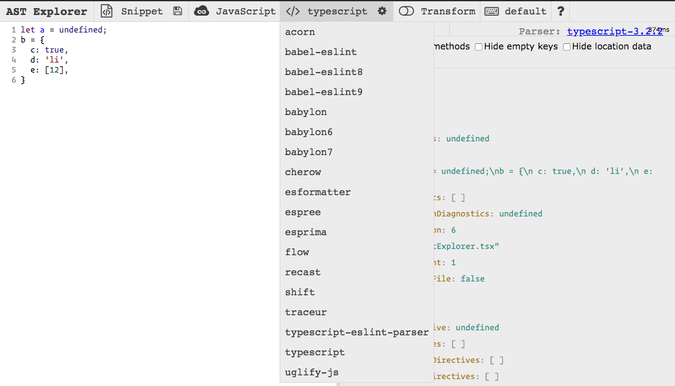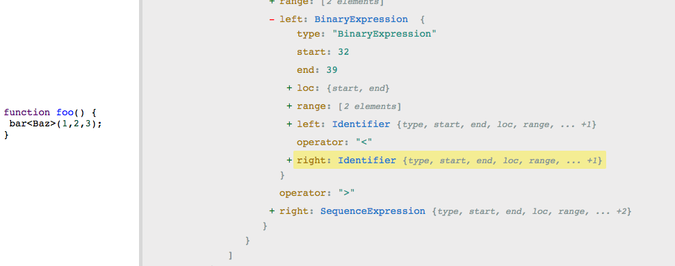Today Wei Gao posed an interesting question:
She was upgrading Flow to v0.85, which requires her to explicitly type the argument of the function call. However, when she saved the file, our eslint-prettier automatically format the code into a weird syntax:
So, when she wrote:
fooFunction<Bar>(1, 2, 3);With eslint-plugin-prettier, eslint “fixed” the code into:
fooFunction < Bar > (1, 2, 3);It felt like eslint sees < and > as the comparison operator, rather than <Type> as a whole!
To confirm with my hypothesis, I opened up my favourite tool for inspecting AST: astexplorer.net
You can paste your code into astexplorer.net and see how different parser “sees” your code in terms of a AST (Abstract Syntax Tree).

As you can see from the picture above, you can choose from different parsers:
- acorn — the parser used by webpack after the loaders, webpack uses acorn’s AST to find
importandrequire()syntax to know generate the dependency tree of your project, as well as provide an entry for plugins like DefinePlugin to transform the transpiled code. - babylon— the babel parser, now it’s called @babel/parser.
- flow, typescript, uglify-js— the parsers that each of the library uses
- esprima — the default eslint parser
- babel-eslint — a wrapper of babel parser for eslint, which is also the one we used, because we have a ton of babel plugins configured, so by using babel-eslint we don’t have to reconfigure the same plugins for eslint.
So I copied our code into astexplorer, and selected the “flow” parser:

I can see the type annotation is being parsed as “TypeParameterInstantiation”, however when I changed the parser to “babel-eslint8”,

I get a Binary Expression and a SequenceExpression!
Binary Expression is a way to express logical expression and mathematical expression, eg: a + b , a && b , a <= b, etc.
Sequence Expression on the other hand is something you don’t see people write that often, you can look up how it works in Comma operator (MDN), basically you can write expressions as a expression by joining them with a comma operator (,), and the expression returns the value of the last expression, eg: result = (a++, b++, c -= 2, d.push(e), --f), you increment a , b , decrement c by 2, and pushed e into d and decrement f and set result to the new value of f. Wow, that’s a lot in one statement! It’s confusing to read, but you see this often in a minified code.
Now this explains why prettier will try to add space in between < and > .
I saw that there’s a babel-eslint9, and I gave it a try, and…

It seems like the bug was fixed on babel-eslint9, so I plowed through the release notes of babel-eslint, and I found this merge commit. So it seems like upgrading babel-eslint to v9 will solve the issue! 🎉